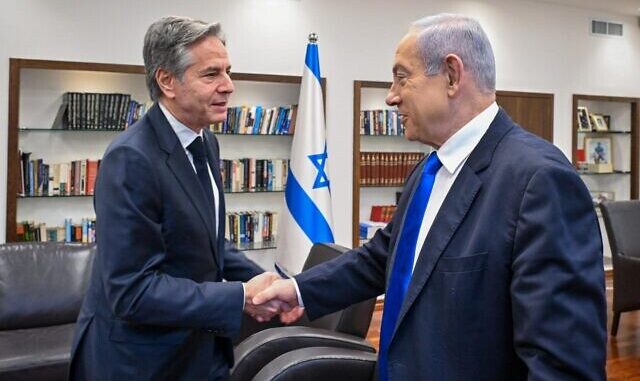Facing a difficult election, Biden and his team want to wind the war down, but they risk encouraging adversaries in the region and beyond
By LAZAR BERMAN Today, 12:43 am

US Secretary of State Antony Blinken on his way to a meeting with President Isaac Herzog in Tel Aviv on January 9, 2024. (Miriam Alster/Flash90)
US Secretary of State Antony Blinken was back in Israel again this week for the fourth, fifth, or sixth time, depending on what one considers a visit.
However you want to count it, there is no question that he has become the face of the Biden administration’s involvement in Israel’s campaign to destroy Hamas in the Gaza Strip.
Despite the ongoing support from the White House, this visit from Blinken felt different. US frustration with Israel’s war leadership was closer to the surface, and disagreements over core issues were at the center of discussions.
Blinken brought with him two prime worries from Washington.
The first is shared by Israel. The fighting against Hezbollah along the border with Lebanon continues to escalate, and a full-blown war against the powerful Shiite militia is more likely than ever.
A war between Israel and Hezbollah would not only destroy Lebanon and exact a steep price from Israel’s home front, but it also risks bringing the US into a fight against Iran and its proxies.

There is no appetite in the US for another Middle East war, and presidents from both parties have been pulling troops out of the region for years.
With its high-profile assassinations of senior Hamas and Hezbollah leaders in Lebanon over the past 10 days, Israel is probably more aggressive than the US would like, but would be happy to see Biden’s special envoy Amos Hochstein hammer out a diplomatic formula that moves Hezbollah off the border and brings the Lebanese Armed Forces down in their stead.
The White House wants civilians to be able to return to their homes in the northern part of the Strip, and wants the war to lead to a political process toward a Palestinian state.

Netanyahu and his war cabinet see things differently. Though to foreign outlets they speak about moving to a new phase of war in northern Gaza, in Hebrew they talk about the continuation of the fight until Hamas is toppled. Deadly battles continue to rage in central Gaza and in Khan Younis, and Rafah has barely been touched.
Some Israeli leaders reportedly told Blinken that there would be no return for Gazans to the north until Hamas agrees to another hostage deal.
And there is absolutely no capacity right now to consider the creation of a Palestinian state among the Israeli public, much less in the government.
“He came out with a long list of expectations and demands of Israel, of which, to my mind, very few can be met,” said Michael Oren, a former ambassador to Washington. “I don’t believe that the army is going to let refugees in any significant numbers back into the north… We can’t let them back yet. They come back, Hamas is going to be with them, and it’s going to get soldiers killed.”
In the readouts of Blinken’s meetings issued by the State Department, the secretary doesn’t talk about Israeli victory or the destruction of Hamas. Instead, Blinken repeatedly stresses US “support for Israel’s right to prevent the terrorist attacks of October 7 from being repeated.”

More jarringly, Netanyahu’s office declined to issue a readout or photos after his meeting with Blinken, or after the war cabinet’s meeting with him, strong evidence that the conversations weren’t as friendly as the Israelis would have liked.
The State Department, meanwhile, turned up the dial on its exhortations about the humanitarian situation in its readout, saying the secretary “stressed the importance of avoiding further civilian harm and protecting civilian infrastructure in Gaza.”
And while Blinken made repeated statements about the hostages and their families, he didn’t once mention the 9 IDF soldiers killed the previous day in Khan Younis.
“I felt the whole thing was tone-deaf,” said Oren.
Back on the table
Amid the discord, an important goal for Israel has returned to the conversation.
Before the Hamas assault on October 7, one of Netanyahu’s top priorities was a normalization deal with Saudi Arabia.

Flying to Israel from a meeting with Crown Prince Mohamed Bin Salman, Blinken was adamant that there was a real possibility of Saudi recognition of Israel despite the war.
” [MBS] and virtually every other leader I talked to supports moving forward with integration, normalization, whatever you want to call it,” he told MSNBC.
But the price of the long-coveted deal has gone up.
It can only happen, Blinken said every time he was in front of a microphone, if Israel agrees to a process that leads to “a pathway to a Palestinian state.”
“That piece has to be a part of any integration efforts, any normalization efforts,” he said. ” That was also very clear in my conversations during the course of this trip, including in Saudi Arabia.”
David Makovsky, fellow at The Washington Institute for Near East Policy, said that he finds credible the idea that the Saudis are open to a deal… and that they are raising the stakes.
“Arab media is showing often a lot of footage of the devastation in Gaza,” he added, “and they are all facing pushback of their public when it comes to this issue [of normalization]. Therefore their feeling is, okay, we got to link this issue to something big, like a two-state solution.”
While the White House certainly has rational reasons to work to limit the scope of the fighting, one also has to take into account the fact that it is a presidential election year in the US. Biden is lagging in the polls against his likely challenger, the Democrats’ bete noire Donald Trump.
Biden needs every vote he can get, and progressives, who never trusted him much in the first place, are furious about his firm backing of Israel. The quicker news in the US moves beyond images of Gazan civilians amid rubble, and the quicker college campuses see anti-Israel protests end, the earlier the Biden team can shift the focus to other issues.
Freilich is convinced that there is a more dire reason for the US to push for an end to the fighting: “We agree on the objective, but at this point, I think they don’t believe we can achieve it, and so they’re transitioning into thinking of what things are going to look like with Hamas still there.”

Others are less pessimistic.
Blinken knows there is no chance of a major breakthrough right now, said Makovsky. “He has shortened his sights, to trying to deal with more current problems in the coming weeks and months, such as the issue of northern Gaza in particular,” Makovsky explained.
But the Biden Administration approach – publicly pushing Israel and repeating its overwhelming desire to keep the conflict limited to Gaza – could come with dangerous unintended consequences.
“The message to the region [underlined during Blinken’s visit] is that the US relationship with Israel is conditional and strained,” said Oren. “Whereas the relationship between Iran and Russia and China is not conditional.”
“They’re going about in the way best guaranteed to actually make [a broader war] happen,” Oren continued. “Think about like this: If you are Iranian, Russian or Chinese and you’re listening to America’s messaging, that, a, it’s not standing foursquare behind Israel, and b, it’s afraid of regional war, is that going to make you less likely or more likely to escalate?”



Yankee, go home! and take your suicide pact with you!